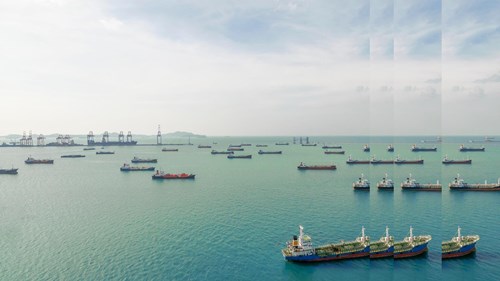EU adopts eighth sanctions package against Russia
Introduction
Following a proposal by the European Commission (“the Commission”), the Council of the European Union (“the Council”) has consented to a new set of sanctions against the Russian Federation (“Russia”) on 6 October 2022. According to a press statement by Josep Borrell, the EU’s High Representative for Foreign Affairs and Security Policy, the EU is thereby reacting to Russia’s escalating war of aggression against Ukraine and Russia’s illegal annexation of Ukrainian territories. The newly adopted measures include the legal basis for a price cap on Russian oil, further restrictions to trade and additional listings of individuals and entities. Moreover, the EU takes steps against the circumvention of existing sanctions. The EU legislators also implemented a variety of minor changes, where previous provisions did not achieve the desired effect, adding further complexity to the sanctions regime.
The eighth sanctions package amends Regulation (EU) No 833/2014 concerning restrictive measures in view of Russia’s actions destabilizing the situation in Ukraine (sectoral sanctions) and Regulation (EU) No 269/2014 concerning restrictive measures in respect of actions undermining or threatening the territorial integrity, sovereignty and independence of Ukraine (financial sanctions). The newly adopted provisions entail a price cap on Russian crude oil implemented by prohibiting its maritime transport to third countries as well as technical assistance and financial services related to the respective logistics. With the price cap on Russian oil, the EU targets the Kremlin’s financial resources and also hopes to stabilize global energy prices. By expanding import bans on steel and paper, amongst other commodities, the EU aims at depriving the Russian economy of revenues of around EUR 7 billion. The expanded restrictions on EU exports to Russia intend to weaken its military industry, while the prohibition of providing certain services, including legal advisory services, to Russian customers prevents them from utilizing European knowledge and expertise. Also, reacting to the recent illegal referenda, the EU expands the geographical scope of certain trade restrictions from Donetsk and Luhansk to the areas of Zaporizhzhia and Kherson by amending Regulation EU 2022/263 concerning restrictive measures in response to the recognition of the non-government controlled areas of the Donetsk and Luhansk oblasts of Ukraine and the ordering of Russian armed forces into those areas.
Besides amending sectoral sanctions, the Implementing Regulation 2022/1906 to Regulation (EU) No 269/2014 extends the financial sanctions list. Newly listed individuals include those responsible for organizing the illegal “referenda” staged by Russia in Ukraine’s occupied territories, strengthening Russia’s military capabilities and spreading disinformation. As a new category, financial sanctions are being imposed on individuals who bypass the sanctions regime.
A. Price cap on Russian oil
As a new instrument, the eighth sanctions package introduces the legal basis for a price cap on Russian oil. To this end, an exception to the – equally newly introduced – prohibition for the provision of maritime transport services to third countries regarding crude oil or petroleum products originating in or exported from Russia is introduced. At the same time, an exception from the prohibition to provide technical assistance, brokering services or financing or financial assistance related to maritime transports is implemented. Utilizing the exception will require compliance with a pre-established price cap. The actual price cap remains to be agreed upon by the so-called “Price Cap Coalition”. For the exception regarding services related to maritime transport, see Article 3n of Regulation (EU) No 833/2014 as amended. As the existence of the price cap triggers the prohibition of the maritime transport services, Article 3n of Regulation (EU) No 833/2014 remains – for now – merely an empty shell.
B. Additional import bans
In order to further deprive the Kremlin of revenues, the existing EU import bans are extended. This applies to certain categories of products that originate in Russia or have been exported from it. They include steel and steel products, wood pulp and paper, certain elements used in the jewelry industry such as stones and precious metals, certain machinery and chemical items, cigarettes, plastics and processed chemical products such as cosmetics. Refer, for example, to Article 3g (d) of Regulation (EU) No 833/2014 as amended for the import prohibition with regard to new types of steel products.
C. Additional export restrictions
The additional export restrictions imposed by the EU aim at Russia’s military and technological capability and the development of its defense and security sector. Thus, the newly restricted items include chemical substances, nerve agents and certain goods used for inhuman treatment. In addition, the eighth sanctions package extends export restrictions targeting the industrial sector as well as the aviation industry. Also, the newly adopted measures include a prohibition to sell, supply, transfer or export firearms, their parts and essential components and ammunition, according to Article 2aa para. 1 of Regulation (EU) No 833/2014 as amended.
D. Additional restrictions on services and activity in Russian SOEs
Extending the ban to engage in any transaction with certain Russian State-owned or controlled legal persons, entities or bodies (“SOEs”), the new measures introduce a general prohibition for EU citizens to hold a post in the respective governing bodies of these entities as from 22 October 2022, Article 5aa para. 1a of Regulation (EU) No 833/2014 as amended.
Also, the ban on the provision of certain services to Russia is extended. This includes, amongst others, legal advisory services to the Government of Russia, legal persons, entities or bodies established in Russia, namely in non-contentious matters like commercial transactions. Legal representation and related advice regarding official proceedings is exempted, according to the amended version of Article 5n of Regulation (EU) No 833/2014, see also Recital (19) of Regulation (EU) 2022/1904. As has been the case with regard to the existing ban of certain services, the provision of services is not forbidden if the services are intended for the exclusive use of legal persons, entities or bodies established in Russia that are owned by, or solely or jointly controlled by, a legal person, entity or body which is incorporated or constituted under the laws of a Member State, a country member of the European Economic Area, Switzerland or a partner country, Article 5n para. 7 of Regulation (EU) No 833/2014 as amended.Also newly included is the prohibition of provision of IT consultancy services to above-mentioned recipients. According to Recital (19) of Regulation (EU) 2022/1904 these cover “consultancy services related to the installation of computer hardware, including assistance services to the clients in the installation of computer hardware (i.e. physical equipment) and computer networks, and software implementation services, including all services involving consultancy services on, development of and implementation of software.”
E. New exceptions
The amendments of the existing sanctions regulations also bring further exceptions from existing prohibitions. Among others, contradictions have been resolved where exceptions from the transaction ban of Article 5aa of Regulation (EU) No 833/2014 could not be used because of the prohibition to make funds and economic resources available to such entities according to Article 2 para. 2 of Regulation (EU) No 269/2014. See Article 6b para. 4 of Regulation (EU) No 269/2014 as amended.
F. New listings
Like previous amendments, the eighth sanctions package adds individuals and entities to the financial sanctions list. This relates to the ongoing escalation of the war in Ukraine on Russia’s side, especially mass mobilization, the illegal annexation of Ukrainian territories and a threat to use weapons of mass destruction. Thus, the list now includes individuals responsible for the organization of the illegal referenda, “officials” of annexed territories, defense officials and companies in the military sector. See Article 1 in conjunction with the Annex of Implementing Regulation (EU) 2022/1906 amending Regulation (EU) No 269/2014 for an overview of newly listed individuals and entities.
G. Circumvention of sanctions
Finally, a new category for financial sanctions listing is added. This includes natural or legal persons, entities or bodies facilitating infringements of the prohibition against circumvention of sanctions. Amongst others, Regulation (EU) No 833/2014 and Regulation (EU) No 269/2014 are mentioned as points of reference, according to the recently inserted Article 3 para. 1 (h) of Regulation (EU) No 269/2014.
Summary and evaluation
Among the newly adopted measures, the price cap on Russian oil will likely have the most significant impact. Relatively high prices on crude oil have continued to contribute to a steady flow of revenue for Russia despite reduced export volumes, thus supporting the Kremlin’s war effort in Ukraine. With the sixth sanctions package, adopted on 3 June 2022, the EU already imposed an import ban on seaborne crude oil and petroleum products aimed at Russia’s most important export commodities. By introducing a price cap on oil, enforced by restricting its maritime transport to third countries and related services, the EU practically expands the geographical and personal impact of the sanction regime regarding oil sales. However, the price cap’s actual amount remains to be decided. Reaching a final agreement on the exact amount of the price cap will require that significant political divides between EU Member States are overcome. It seems obvious that the decision to introduce the legal framework first most likely helped to accelerate the adoption of the new sanctions package.
A related discussion concerns a temporary price cap on Russian gas, an idea introduced by Commission President Ursula von der Leyen. This idea has not reached consensus among EU Member States yet, as media outlets report.
Compared to the price cap on Russian oil, other newly introduced restrictions to trade will likely have a less significant impact in a broad context. For example, depriving Russia’s economy of EUR 7 billion in revenues by introducing new import bans has to be assessed in view of its overall export volumes which, in 2021, reached almost USD 500 billion. However, within the branches directly affected by import bans or export restrictions, the newly adopted measures will have a noticeable effect.
The fact that, once again, exceptions needed to be implemented, underlines the rather complex system of the EU sanctions regime. Unlike in other jurisdictions, authorizations need to have a very exact legal basis and, therefore, need to be implemented in the regulations directly in a quite detailed manner. In situations like the present, where regulations have to be drafted and agreed upon rather quickly, situations requiring exceptions might be easily missed and, therefore, need to be included afterwards. This, of course, brings along painful delays for those relying on the exceptions.
As far as financial sanctions are concerned, the targeting of individuals circumventing sanctions constitutes the most remarkable amendment. By imposing sanctions without a direct link to European jurisdictions, the EU may be seen as taking light steps towards a secondary sanctions regime. Considering the EU’s firmly settled view – confirmed by the European Court of Justice - that secondary, or extraterritorial, sanctions such as those imposed by the United States, are inconsistent with basic principles of public international law, this move will certainly not go unnoticed. Besides, the prevention of circumventing sanctions is in line with earlier measures imposed by the maintenance and alignment package of sanctions adopted 21 July 2022, which also served this purpose.
Well
informed
Subscribe to our newsletter now to stay up to date on the latest developments.
Subscribe now









